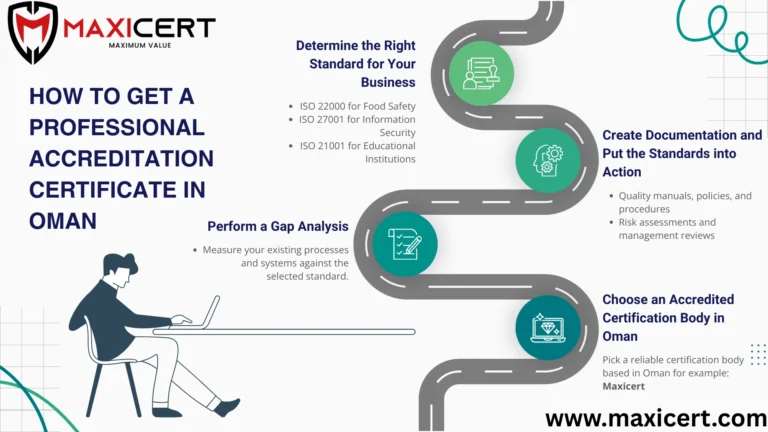What Is a Professional Accreditation Certificate and Why It Matters

Introduction
In today’s fast-paced and compliance-focused business environment, a professional accreditation certificate — especially an ISO certificate — has grown to mean much more than a box ticked on a to-do list. It is a passport to global respect, a badge of quality and operational excellence recognized on every continent. Whether you run a budding startup or manage a global enterprise, earning this credential signals to customers, partners, and regulators that you align with internationally accepted standards, adhere to best practices, and are committed to perpetual improvement.
For companies in Oman, securing a professional accreditation certificate bolsters local trust and simultaneously unlocks regional and global markets, government tenders, and a sustainable future. In this post, we will break down what a professional accreditation certificate really is, why ISO certification has become a linchpin for success, and how your organization can navigate the process with maximum efficiency.
What Is a Professional Accreditation Certificate
A Professional Accreditation Certificate is a formal record confirming that a person, organization, or system has satisfied defined benchmarks of quality, capability, and performance set by a recognized accrediting body. In the corporate world, this frequently appears as an ISO certificate, granted by a body that is globally acknowledged for its impartial assessment.
What Does a Professional Accreditation Certificate Mean?
- Professional accreditation demonstrates that your organization’s processes, offerings, or products align with recognized international or sector-specific performance standards.
- It is more than a badge, it is an acknowledgment of your ongoing investment in quality, customer trust, and regulatory adherence.
- Certain sectors, particularly those that pose a significant risk to safety or wellbeing — such as healthcare, construction, manufacturing, education, and food safety — often mandate or strongly encourage accreditation.
Read more about Professional Accreditation .
Request A Free Quote
What Makes the ISO Certificate Exceptional
The International Organization for Standardization (ISO) creates internationally recognized standards that promote quality, safety, efficiency, and interoperability across diverse sectors.
An ISO certificate:
- Is awarded by an impartial, recognized certification authority.
- Verifies that your management systems conform to the specific ISO standard’s criteria.
- Ranks among the most globally recognized and respected forms of professional validation.
- Popular ISO standards:
- ISO 9001 — Quality Management
- ISO 14001 — Environmental Management
- ISO 45001 — Occupational Health & Safety
- ISO 27001 — Information Security
- ISO 22000 — Food Safety
ISO Certification = Professional Accreditation in Action
Securing ISO certification is more than a plaque for your reception area. It signals to the marketplace that your organization:
- Follows recognized best practices
- Produces consistent, high-quality outcomes
- Is audit-ready, risk-aware, and poised for expansion
To sum up, while a professional accreditation verifies that you meet an industry standard, ISO certification verifies the efficiency and reliability of your underlying processes. Together, they function as dual engines for building trust, attracting clients, and scaling your business effectively.
Why Accreditation Matters in Oman's Economic Transformation
Oman is boldly reforming its economy under Vision 2040, a roadmap that seeks diversification, elevated global competitiveness, and innovation in every sector. Within this sweeping transition, professional accreditation, especially ISO certification, is vital in bringing businesses into harmony with global standards and the United Nations Sustainable Development Goals.
Supporting Diversification and Industrial Growth
Oman is actively broadening its economic base beyond oil, expanding into sectors such as manufacturing, logistics, tourism, healthcare, IT, and green energy, and accredited firms are emerging as the trusted choice for partners in both national and global supply chains.
- ISO certification equips companies to meet international standards, paving the way for seamless market access.
- Such accreditation is increasingly required for sectors actively courting foreign direct investment.
Integrating with National Reforms and Legal Frameworks
Oman’s regulatory agencies now explicitly feature ISO and relevant certification requirements in the following areas:
- Government procurement and tender evaluation
- Industrial licensing and new business registration
- Compliance with environmental and occupational health standards
Consequently, accreditation is evolving from a discretionary enhancement to a strategic essential for sustained engagement in Oman’s growing, diversified economy.
Boosting SME Competitiveness
Oman’s leaders are channeling energy into strengthening small and medium enterprises. Being officially accredited enables SMEs to:
- Demonstrate consistent quality and gain customer confidence
- Tap into public-sector programs, secure finance, and participate in tenders
- Compete equally with larger companies in high-stakes bids
Aligning with Vision 2040
ISO certification aligns seamlessly with Oman’s Vision 2040, advancing:
- Transparent and effective governance across institutions
- Sustained economic growth powered by innovation
- Environmental stewardship and efficient resource use
Accreditation fosters streamlined operations, loyal customers, and compliance with regulations, driving Oman’s development forward.
How to Get a Professional Accreditation Certificate in Oman

Why an ISO Certificate Matters for Your Business
- Builds Trust and Credibility
Customers and partners gravitate toward firms with ISO certification. It signals that you follow a transparent, assessed framework for quality and responsibility. - Meets Legal and Regulatory Requirements
Numerous contracts, especially those with government agencies and large corporations, make ISO certification a non-negotiable condition for participation. - Improves Operational Efficiency
ISO benchmarks foster more organized workflows, minimize mistakes, and optimize resource use throughout your organization. - Enhances Market Access
ISO certification removes barriers to international markets, simplifying export procedures and boosting your competitiveness worldwide. - Drives Continuous Improvement
ISO standards embed a mindset of perpetual enhancement, laying the groundwork for sustained growth and ongoing innovation.
Who Needs a Professional Accreditation Certificate in Oman?
- Businesses Seeking Government Contracts
- Manufacturing and Industrial Companies
- Healthcare Providers and Medical Facilities
- Educational Institutions
- IT and Technology Companies
- Food and Beverage Businesses
- Startups and SMEs
- Logistics and Transportation Providers
Selecting the Right ISO Standard
Beginning the Journey
- Engaged an ISO specialist — To ensure every member of your organization goes through the stages of buildup without missing core details, partner with an ISO specialist who has relevant experience. One of the most trusted ISO consultants in Oman, Maxicert, provides mentorship tailored to your industry.
- Choose a recognised certifier — It is equally important for the certifier to be regarded as an authoritative body. Check whether the certifier is accredited by UKAS, IAS, NABCB, or other relevant national boards as this will add international value to your certification.
- Map out budget and timeline — For larger organizations and those who already have a certain level of ISO standards in place, the expectation is at a timeline of 3 to 6 months. Consider budget for training, documentation, and consultation as well as audits.
Guidance through documentation and remote assessment saves even micro-enterprises time and money on travel and operational costs. Maxicert’s flexible consulting models enable small businesses to achieve ISO compliance without exhaust their resource.
Conclusion
A verified ISO certificate shows your organization meets stringent international criteria. From bolstered credibility to streamlined operations and improved risk management, the advantages accumulate. Rather than treating certification as a burden, recast it as a strategic investment that returns dividends in trust, growth, and durability.
Ready to Secure Your ISO Certificate?
Open new markets and strengthen your reputation with our complete ISO consulting services.

Get In Touch

Get In Touch

Get In Touch
Need A Free Estimate?
Get a free consultation and Checklist to get certified for ISO , HALAL, CE Mark Certification.
FAQ
What is a professional accreditation certificate?
A professional accreditation certificate is an official recognition issued by a recognized authority, confirming that an individual meets specific industry standards and competencies.
Do small businesses need ISO certification?
It’s not required by law, but small businesses can benefit a lot. ISO helps build trust, improve operations, and attract bigger clients or export opportunities.
What's the difference between ISO accreditation and certification?
Accreditation gauges the competence of the body that issues the certificate; certification validates the management system of your organization.
How can I get a professional accreditation certificate in Oman?
You can obtain one by enrolling in an accredited training program, completing the required coursework and assessment, and receiving certification from a recognized body like IRCA, NABCB, or ISO.



